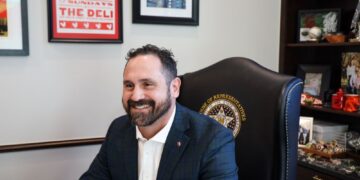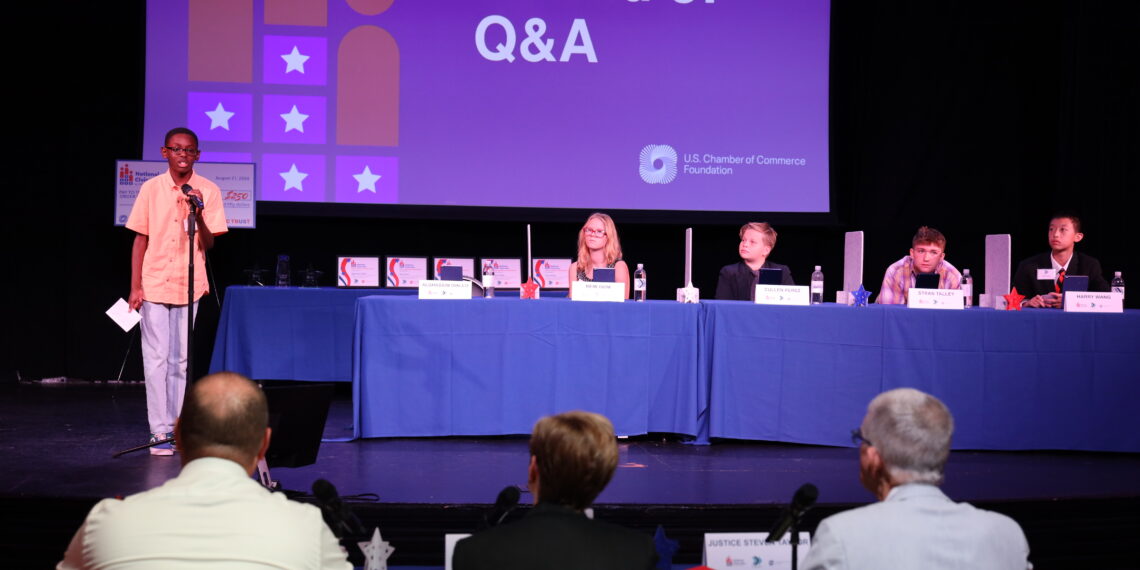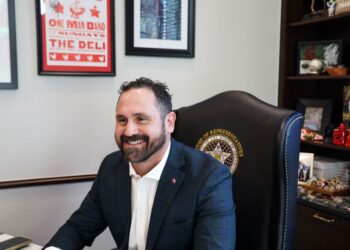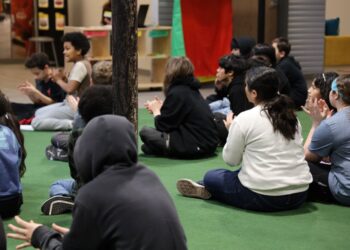OKLAHOMA CITY (OBV) — A young Oklahoma Civics Bee finalist spoke during the championship competition in favor of making cell phones less of a distraction in classrooms. Three weeks later, Gov. Kevin Stitt issued a challenge for schools to become phone-free.
The State Chamber partnered with The Civic Trust® of the U.S. Chamber of Commerce Foundation to present the Oklahoma finals of the National Civics Bee at Will Rogers Theatre in Oklahoma City on August 21.
Alghassim Diallo, a seventh grader at Lawton MacArthur Middle School, was one of five finalists who participated in the state finals.
The finalists competed by answering challenging civics questions and giving speeches about the essay each wrote prior to the competition.
Diallo qualified for the state finals when he became the first place winner in the Lawton MacArthur Civics Bee.
In his state finals speech, Diallo spoke about how schools can prevent cell phones from being a distraction in class.
Diallo told Oklahoma Business Voice that he was inspired to write his essay on limiting cell phones in schools after his teacher spoke about a petition to ban phones from schools.
“I have noticed sometimes students using their phones during class, which is a problem,” Diallo said.
Phones are a distraction in the classroom, Diallo said.
“Using phones disrupts the learning environment and communication between students and teachers,” Diallo said.
Stitt voiced his own concern on cell phones in schools when he issued a “Phone-Free Schools Challenge” on Sept. 11.
The purpose of the challenge – issued as Executive Order 2024-26 – is to address problems associated with in-school cell phone usage, including distractions from classwork, bullying and learning difficulties.
The governor called upon students, teachers and superintendents to submit solutions for managing cell phone use in schools.
“Cell phones are useful tools, but far too often, they cause distractions in the classroom. I know we can’t solve a problem like this with a top-down, heavy-handed government mandate,” Stitt said. “I know our students and teachers have the creative and innovative minds to solve this problem in their classroom, so I want to empower them to do just that. That’s why we’re launching the Oklahoma Phone-Free School Challenge.”
Stitt gave students, teachers and administrators until Nov. 29 to submit their ideas, policies, and best practices for cell phone use in schools to the Governor’s Office.
Submissions will be reviewed for inclusion in an Oklahoma Phone-Free Schools best practices report, which will be compiled by Secretary of Education Nellie Sanders and Chief Advisor of Health and Mental Health Ellen Buettner.
“Student attention is being challenged in ways we’ve never faced before,” Sanders said. “Students are enduring a mental health epidemic that can’t be ignored, and we have an opportunity to eliminate one of the driving culprits: cell phones. As we explore the idea of cell phone-free schools, we’ll put student mental health first, approach it with empathy, and take our classrooms back.”
Buettner applauded Stitt’s proactive effort against cell phones in the classroom.
“By launching the Oklahoma Phone-Free Schools Challenge, we are taking a critical step toward safeguarding students’ mental health and enhancing their educational experiences,” Buettner said. “This effort will provide valuable insight into the impact of cell phones on academic performance and mental health.”
A Pew Research Center survey found that 72 percent of high school teachers in the United States said that cell phone distraction is a major problem in classrooms.
The survey also notes that 33 percent of middle school teachers and 6 percent of elementary school teachers said that cell phone distraction is a significant problem among students.
Numerous school districts throughout the nation implemented cell phone policies, including requiring students to turn off their phones during class or leaving them with administrators during the school day.
Eighty-two percent of K-12 teachers say their school district has a cell phone policy. However, 30 percent of those teachers say cellphone polices are either very or somewhat difficult to enforce.
Diallo has his own suggestion for making cell phones less of a distraction in the classroom.
“To solve the problem, Gov. Stitt can help pass a law that allows all schools in Oklahoma to place students’ phones in lockers, or locked boxes until the end of the day,” he said.
Diallo’s essay and success as a Civics Bee competitor is a source of pride for his parents.
“The first time, when he decided to write that essay, he said, ‘Hey, I want to take part in this.’ I said, ‘Hey, by all means, go ahead.’ And I was proud as a parent. I said, ‘Okay, well, he got something that he wants to do.’ And when he took the first place prize for Lawton I was very proud,” his father Abdourahamane Diallo said.
Alghassim says civics is an essential part of every student’s education.
“I think it’s important because, when you grow up, how are you going to apply for your taxes or vote if you don’t know anything about civics,” he said.
The 2024 National Civics Bee will be held in Washington, D.C. on Tuesday, Nov. 12.

















